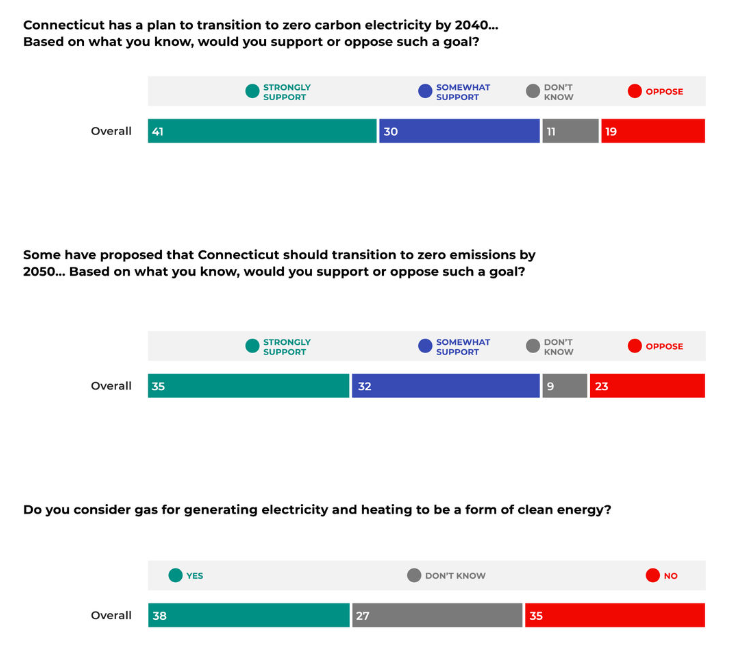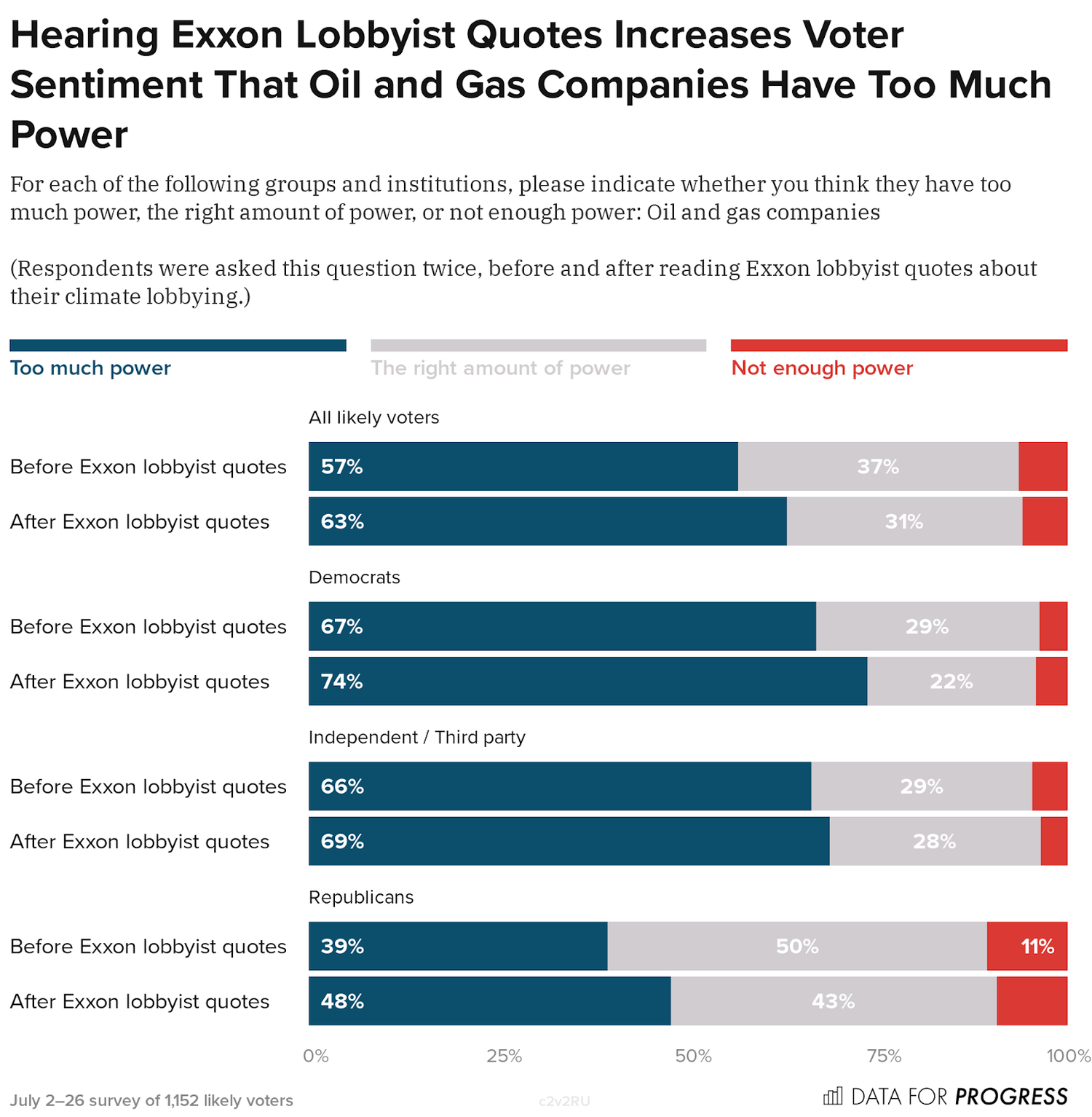Resources
Search below for resources covering the intersection of climate engagement, social science and data analytics.
RESULTS
Environmental Polling Roundup - February 11th, 2022
This post includes climate and environment headlines, data points, and key takeaways from recent public polls - including a new international sustainability poll from POLITICO and Morning Consult, findings about the public’s reactions to different terms for methane gas, and state-level polls in Indiana, Maryland, and Wisconsin.
Poll: Maryland Voters Support 60% Cut in Greenhouse Gas Pollution and Mandate for All-Electric New Buildings Statewide
A majority of Maryland voters want strong action on climate change from the General Assembly this year, with clear majorities support cutting greenhouse gas emissions 60% by 2030. Voters also support a mandate that newly constructed buildings be powered by electric-only energy systems for heating, hot water, and cooking.
- 63% of voters support a core proposal to cut greenhouse gas pollution 60% by 2030 (below 2006 levels), in line with key scientific recommendations.
- A majority (53%) of all voters believe state legislators should mandate that all new buildings use electric-only energy systems for space-heating, hot water, appliances, and cook stoves. 78% of Democratic voters support the electrification policy.
- 72% of Democratic voters say they are more likely to vote for candidates who prioritize clean energy policies to combat climate change. Those numbers are different for Republicans, with nearly half (46%) saying clean energy would have no effect on their vote.
Poll: 60% of Americans say oil firms are to blame for the climate crisis
Oil and gas companies are unpopular, and most Americans say that oil and gas companies bear responsibility for causing climate change, especially after reading basic information on the topic. The survey found that major oil companies are underwater in their favorability among adults nationwide, including: BP (15% positive / 40% neutral / 33% negative); Shell (24% positive / 46% neutral / 26% negative); Exxon (22% positive / 43% neutral / 32% negative). By contrast, Americans tend to view other large corporations such as Apple (38% positive / 34% neutral / 28% negative), Amazon (50% positive / 21% neutral / 28% negative), Target (51% positive / 33% neutral / 15% negative), and Wal-Mart (43% positive / 27% neutral / 30% negative) more positively than negatively. Additionally, after reading information about how oil and gas companies misled the public about man made climate change, majorities of Americans agree with the following statements: the government and the public should hold oil and gas companies accountable today (62% agree); oil and gas companies should help pay to upgrade infrastructure so it can withstand the extreme weather events caused by climate change (60%); oil and gas companies should pay for the damages caused by extreme weather events attributed to climate change (56%).
Poll: Connecticut Voters are Ready for Bold Action on Climate and Clean Energy
A poll of 600 registered voters across Connecticut revealed a number of helpful data points about current voter attitudes towards clean energy and fossil fuels including:
POLL: Voters Support Clean Energy Infrastructure
Make the connection between methane emissions and climate change. This poll finds that while a majority of voters support stricter regulations on methane, only 44 percent think that methane is polluting and 77 percent have a favorable opinion of natural gas, a major source of methane emissions. The poll also reports majority support for clean energy infrastructure investments, with more than two-thirds of voters in favor of raising taxes on the wealthy to pay for them.
Environmental Polling Roundup - September 10th, 2021
This post includes a roundup of climate + environment headlines from this week’s public polls, good data points to highlight, and a full roundup with key takeaways from each poll - including new polls on the Build Back Better budget, a study on the impact of language in the natural gas debate, and extreme weather polling.
HEADLINES
- Navigator - Specific details engender broad support for the Build Back Better budget, even when it’s framed as a Democratic bill (Release, Slide Deck, Topline)
- Washington Post/ABC News - The Build Back Better budget has slim majority support when described as $3.5 trillion in spending for “expanded social programs, educational assistance and programs to address climate change” (Topline, Crosstabs)
- No Labels & American Action Network - Opposition polls claim that Americans want to pause on the kind of government spending included in the Build Back Better budget (Axios Article on No Labels Poll, No Labels Release, American Action Network Release)
- Yale Program on Climate Change Communication - Language used to describe gas as an energy source is hugely impactful in shaping opinions; Americans have positive attitudes about “natural gas,” but not about methane (Academic Paper, YPCCC Article)
- Economist/YouGov - Americans continue to attribute recent extreme weather events more to climate change than natural patterns; nearly one in four say they were personally impacted by Eastern seaboard hurricanes (Topline, Crosstabs)
Oil and Gas Companies Have Too Much Power
Many Americans believe that the oil and gas industry has too much power and influence in Washington, with support coming from both sides of the aisle. Two-thirds (67%) of Democrats believe the industry has too much power, while 39% of Republicans agree that they have too much power. When presented with quotes from an Exxon lobbyist that highlights the influence Exxon has in the capital, however, these percentages increase to 74% and 48% respectively. Finally, this research finds that when “oil and gas companies” is used, rather than “fossil fuel companies,” the percentage who believe that the industry has too much power increases. Advocates interested in highlighting these finding should consider focusing on the bipartisan distrust in the oil and industry, and use “oil and gas” language rather than “fossil fuel” language.
Poll: More Voters Than Not Oppose Developer’s Decision to Abandon Keystone XL Pipeline
Voters have mixed reactions to the Keystone XL cancellation and to halting fossil fuel projects more generally. Morning Consult’s national tracking poll included a few questions on the Keystone XL pipeline cancellation. While voters didn’t pay much attention to it (just 12% report that they heard “a lot” about the story), more say they oppose the pipeline’s cancellation (42%) than support it (32%). The poll also asked whether voters generally believe the U.S. should “stop or continue to allow the construction of major new fossil fuel infrastructure, like pipelines.” A narrow majority (52%) are in favor of allowing new fossil fuel projects, while just 29% want to stop them.
Poll: After Historic Outages, Texans Favor Solar, Wind and Other Clean Energy
Polling research shows that after historic power outages in February 2021, most Texans are in favor of the state producing more renewable energy and reducing their dependency on fossil fuels.
- About six in 10 Texas voters say that the state should add solar (65%) and wind (58%) energy resources. There was less support for natural gas (45%), nuclear (28%), and coal (20%).
- 30% of Texas voters strongly agree and 26% somewhat agree that the primary goal of Texas’ energy policy should be achieving 100% clean power.
- 45% of Texas voters strongly agree and 32% somewhat agree that being a leader in clean energy innovation is important to Texas’s future.
Poll: Voters Support Stimulus for Clean Energy, Climate
American voters strongly support clean energy infrastructure investments to kickstart the economic recovery, support action on climate change as part of stimulus recovery packages, and want their elected officials to support those policies as well.
As part of an economic stimulus package, a majority of voters support:
- Assisting states and regions recovering from recent extreme weather and climate disasters (79%);
- Reinforcing infrastructure to withstand the effects of climate change and extreme weather such as severe flooding and hurricanes (73%);
- Building new power lines to transport renewable energy (70%);
- Creating a jobs program for unemployed oil and gas workers to safely close abandoned oil and gas wells (69%);
- Expanding public transportation such as high-speed rail, subway and light rail systems, and electric buses (67%);
- Expanding tax credits and other incentives to expand renewable energy such as solar and wind (66%); and
- Building and expanding charging infrastructure for electric vehicles (59%).
Pagination
- Previous page
- Page 5
- Next page




